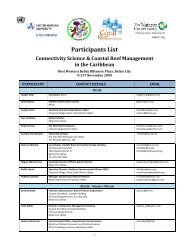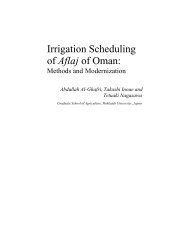The Global Water Crisis: Addressing an Urgent Security - Unu-inweh ...
The Global Water Crisis: Addressing an Urgent Security - Unu-inweh ...
The Global Water Crisis: Addressing an Urgent Security - Unu-inweh ...
Create successful ePaper yourself
Turn your PDF publications into a flip-book with our unique Google optimized e-Paper software.
3. Pioneers in the Blue Economy<br />
<strong>The</strong> economic risks <strong>an</strong>d opportunities for water are only just beginning to register for most government <strong>an</strong>d business<br />
m<strong>an</strong>agers. However, a number of pioneers in the Blue Economy have emerged <strong>an</strong>d are leading the way in the development<br />
of new approaches, innovative technologies, <strong>an</strong>d ways of working together to confront the challenge.<br />
3.1. Leading jurisdictions<br />
A h<strong>an</strong>dful of countries <strong>an</strong>d geographic regions have established themselves as leaders in the ‘innovation ecosystems’<br />
that lead to the creation of new water technologies, services <strong>an</strong>d practices. For example, despite a lack of abund<strong>an</strong>t local<br />
source water, Singapore has recognized the growing opportunities in the water sector <strong>an</strong>d is investing to become a global<br />
‘hydro hub’ (2030 <strong>Water</strong> Resources Group, 2009; IBM, 2009). <strong>The</strong> country’s national water agency, PUB, is working to<br />
reduce reli<strong>an</strong>ce on imported water (from Malaysia) <strong>an</strong>d costly desalinated water by increasing the supply with reclaimed<br />
water <strong>an</strong>d driving down dem<strong>an</strong>d through a conservation pl<strong>an</strong>. <strong>The</strong> reclaimed water, called NE<strong>Water</strong>, involves separating<br />
the collection <strong>an</strong>d redirection of wastewater <strong>an</strong>d run-off rainwater <strong>an</strong>d treating used water with adv<strong>an</strong>ced-membr<strong>an</strong>e<br />
filtration. Through its innovative efforts, Singapore aims to generate roughly 11,000 professional <strong>an</strong>d skilled jobs by 2015<br />
(2030 <strong>Water</strong> Resources Group, 2009).<br />
Israel is <strong>an</strong>other country with scarce water supplies that has turned a vulnerability into a major asset. Since 1964, the<br />
Israeli population has nearly tripled; however, Israeli farmers have succeeded in producing nine times the amount of<br />
food with a mere 3% increase in water consumption (IBM, 2009). This productivity is typically attributed to the sector’s<br />
technological prowess, <strong>an</strong>d indeed Israel is a global leader in precision agriculture. However, this technological adv<strong>an</strong>cement<br />
was made possible by placing proper valuation on water, investing in adv<strong>an</strong>ced education, creating platforms for new<br />
business ventures, <strong>an</strong>d developing programmess to attract private funds (Cle<strong>an</strong>tech Group, 2011; IBM, 2009). Israel’s<br />
Novel Efficiency <strong>Water</strong> Technologies (NEWTech) programme has produced 26 government-funded water technology<br />
incubators, which have attracted nearly US $700 million in private investment (Cle<strong>an</strong>tech Group, 2011). Israel boasts<br />
more th<strong>an</strong> 250 water technology businesses, which, when combined, exported US $1.4 billion worth of goods in 2008<br />
(2030 <strong>Water</strong> Resources Group, 2009).<br />
Scarcity is not the only driver of innovation in water. <strong>The</strong> need to remove pollut<strong>an</strong>ts, to reduce energy <strong>an</strong>d other costs<br />
associated with water distribution, <strong>an</strong>d to replace or repair aging water infrastructure, is common to m<strong>an</strong>y regions of<br />
the world, wet or dry. Governments that share the North Americ<strong>an</strong> Great Lakes basin, a region that contains 20% of<br />
the world’s fresh surface water supplies, have identified water as a key economic asset. <strong>The</strong> region faces challenges<br />
related to water pollution concerns, crumbling water infrastructure, <strong>an</strong>d water stress in urb<strong>an</strong> areas located away from<br />
the lakes. It is also a region that has gone through economic decline due to a loss in its traditional m<strong>an</strong>ufacturing base,<br />
particularly in sectors such as auto m<strong>an</strong>ufacturing. Me<strong>an</strong>while, it has produced some major technological innovations in<br />
water <strong>an</strong>d wastewater treatment, such as the ground-breaking treatment technologies of Troj<strong>an</strong> Technologies <strong>an</strong>d ZENON<br />
Environmental (purchased by General Electric in 2006).<br />
To build on the successes of Troj<strong>an</strong> <strong>an</strong>d ZENON <strong>an</strong>d as part of a broader push towards a green economy, the Ontario<br />
Government in C<strong>an</strong>ada recently passed the <strong>Water</strong> Opportunities <strong>an</strong>d <strong>Water</strong> Conservation Act, with the goal of making<br />
Ontario the North Americ<strong>an</strong> leader in the development <strong>an</strong>d sale of water conservation <strong>an</strong>d treatment technologies.<br />
To achieve this goal, it has created the <strong>Water</strong> Technology Acceleration Partnership (<strong>Water</strong>TAP) to support research,<br />
development <strong>an</strong>d commercialization of new technologies <strong>an</strong>d innovations in the water sector. Similarly, the Milwaukee<br />
<strong>Water</strong> Council in Wisconsin, USA was created to convene <strong>an</strong>d build partnerships between the research clusters <strong>an</strong>d more<br />
th<strong>an</strong> 130 water technology comp<strong>an</strong>ies in the region. <strong>The</strong> Council aims to establish the Milwaukee region as a ‘World <strong>Water</strong><br />
Hub’ for water research, economic development, <strong>an</strong>d education. Another water hub is emerging just south of the Great<br />
Lakes basin in southwest Ohio, southeast Indi<strong>an</strong>a <strong>an</strong>d northern Kentucky, USA where, in 2011, the US Environmental<br />
Protection Agency (EPA) launched the <strong>Water</strong> Technology Innovation Cluster (WTIC). WTIC aims to establish the region as<br />
a global leader in sustainable, environmental technology innovation, with <strong>an</strong> initial emphasis on water.<br />
Innovation is not limited to highly developed jurisdictions. <strong>The</strong> city of Durb<strong>an</strong>, South Africa is working to provide adequate<br />
drinking water <strong>an</strong>d s<strong>an</strong>itation to each resident of its growing population, whether wealthy or impoverished. Low pressure<br />
delivery reduces the amount of drinking water lost to leakage. More th<strong>an</strong> 60,000 urine diversion toilets <strong>an</strong>d nearly <strong>an</strong>other<br />
62 <strong>The</strong> <strong>Global</strong> <strong>Water</strong> <strong>Crisis</strong>: <strong>Addressing</strong> <strong>an</strong> <strong>Urgent</strong> <strong>Security</strong> Issue




